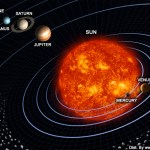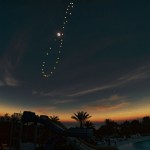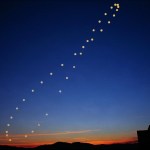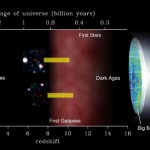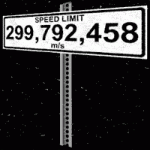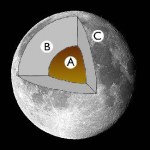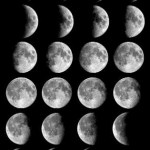Q & A
The cradle rocks above an abyss, and common sense tells us that our existence is but a brief crack of light between two eternities of darkness. -Vladimir Nabokov
Last Friday, I posed a question to you, and you kindly responded by voting as to whether, when you crossed the event horizon of a black hole, the lights would stay on or go off. The results so far?
What do I have to say? Good for you! Just because no light gets out doesn't mean that you can't see the light that comes in! When you're in your spaceship, very few things matter.
You could be in a strong gravitational field, like exists…
Black holes have come up a couple of times this week, and I've always wondered something. When you fall into a black hole, all sorts of strange things happen.
The most well-known one is that nothing -- not even light -- can ever escape once it falls in. Well, my question is, if you fell in to a black hole, as you crossed the event horizon in your sturdy, well-lit spaceship, would the lights stay on or would they go out as you crossed into the black hole? (Ignoring the tidal forces that would rip you and the spaceship apart.)
In other words, you've read the first 1497 pages of the Count of…
In the comments on one of my posts, someone pointed me towards Stephen Crothers, who gives the following argument (in a nutshell) as to why black holes cannot possibly exist:
General Relativity is our theory of gravity, which relates the curvature of space to the gravitational acceleration of objects.
This theory only works in certain regimes; it breaks down at the point of singularities.
A black hole, as predicted by Schwarzschild, is a singularity.
Therefore, since singularities are forbidden by General Relativity, there is no reason to think that black holes exist.
(You can watch his…
In 1908, a huge fireball streaked across the sky and exploded a few kilometers above the Earth's surface, downing trees for miles and miles around but leaving no impact crater on the ground. This mystery was known as the Tunguska event.
But how did this happen? The amount of energy released was estimated to be somewhere between 5 and 30 Megatons of TNT. (Comparably to a "typical" hydrogen bomb.) What could've caused this devastation?
My answer: a large meteor or small asteroid/comet could have done this easily. How? Let me explain.
When a meteor enters Earth's atmosphere, it's moving very,…
It's only natural to wonder why things are the ways that they are. Take a look at our Solar System, for example.
A central bulge with planets, moons, and whatnot moving in a disc around it. Is this the way things have to be? My friend Rich, a chemist, asks:
It seems that all the objects in our solar system orbit the sun in nearly the same plane. Why is that? Why doesn't the solar system have spherical symmetry?
In particular, Rich wants to know why our Solar System doesn't look more like this:
Our Solar System is definitely not shaped like a sphere; it definitely is a bulge at the center…
Though my soul may set in darkness,
It will rise in perfect light,
I have loved the stars too fondly
To be fearful of the night. --Sarah Williams
Everyone knows how you see things during the day: sunlight makes it possible. Delivering huge amounts of visible light to the entire "day" side of the planet, everything becomes illuminated to human eyes.
But things change rapidly once the Sun goes down. Even with a full Moon in the sky (like last night), the amount of light reaching the Earth at night is over 100 trillion times less than during the day.
Still, we have a great pair of eyes, and…
Last week, we got a chance to talk about why the sky is red toward sunset and sunrise but blue everywhere else: the atmosphere. Red light passes through the atmosphere pretty well, but blue light gets scattered more easily. When you look to the horizon at sunset/sunrise, the light passes through a tremendous amount of atmosphere, scattering the blue light all over the sky, but allowing the red light through to your eyes.
But then, I got a very good follow-up question:
Sometimes, either at night or in the morning, not just the horizon but nearly the entire sky turns red! Why does this happen…
So, I have a small confession for you, my readers. Since I first started writing this blog, I have always solicited questions, and promised to answer the best ones. Recently, this has come back to bite me, as I've started getting more questions than I possibly have time to answer. However, the ones that meet the following criteria:
are of interest to a very broad, general audience,
are clear, well-posed, and straightforward, and
I can actually provide an answer to them,
will, more often than not, get answered right here. This one comes from reader Dan Noyes, who writes:
I have a question…
On Monday, I posed a question to you as to why, when you photograph the Sun at the same exact time every day for a year, you get something that's shaped like a figure 8, like so:
Image credit: Tunc and Cenk Tezel.
We got a good number of thoughtful comments, many of which are on the right track, and many of which have some misconceptions. Let's clear them up, and then let's give you the explanation of what gives us our figure 8, and why other planets make other shapes.
What does the analemma look like at other places on Earth? You can see, above, that (from the ruins) the above analemma is…
I'm trying something new here: I'm going to give you a little bit of information and a teaser, and we'll see -- in the comments section -- whether any of you can figure it out.
Imagine that you went outside, each and every day at the same time, and mapped the position of the Sun. What would you see?
Image credit: Astrosurf.
Doing this -- taking a snapshot of the Sun at the same exact time from the same exact place on different days -- gives you what's called an analemma. Now, on Earth, the top of the analemma happens during the Summer Solstice, the lowest point of the analemma happens…
Every once in awhile, a question makes it to my inbox that's too good to ignore.
A friend and I were joking about being "older than dirt" and he asked a question I thought you might enjoy: "Hey, ask Ethan how old dirt is and how it got here."
You did the smart thing by coming to me, because the alternative is to ask yahoo. (Shudder!) Well, right away, we've got an upper limit, because the entire Solar System is only about 4.5 billion years old. So, there's no way that this:
is any older than this:
Now, you can definitely go looking for the oldest rocks on Earth, and if you look very hard,…
I get a certain question every so often, and it's one of the most difficult questions any cosmologist faces. Today, I try to tackle it. It goes something like this:
If the Universe is 13.7 billion years old, and nothing can go faster than the speed of light, how is it that we see things that are 46.5 billion light years away?
First off -- and I want to clarify this -- everything in this question is legit.
1.) The Universe is 13.7 billion years old. There are small errors there -- no one would be surprised if it was 13.5 billion or 14.0 billion years old -- but it's definitely not 12 billion…
Understanding the Universe requires a lot more than just knowing some advanced mathematics, and even more than knowing how to apply that math. It requires a knowledge of natural history, and an understanding of the requirements for allowing that history to happen.
In other words, the laws of nature must be such that the Universe can exist as it does. Seems like a very simple, innocuous, and self-evident statement. Yet in this simplicity, we can learn a few important things about the Universe. Reasoning, using this statement, is often referred to as the anthropic principle.
There is more…
The coolest things about science are often at the frontiers. We love to press the limits of nature: to cool things down as close as possible to absolute zero, to raise energies as high as possible, and to speed them up as fast as possible. But when it comes to speed, there's an absolute limit: the speed of light in vacuum.
Relativity tells us why this is the absolute limit: the faster you want to go, the more energy it takes. But, as you get close to the speed of light, you effectively increase the mass of your speedy particle, which makes it ever harder to accelerate it. In fact, it would…
Or, to put it as one of my readers/questioners did,
Why doesn't the Space Needle, a top-heavy skyscraper, ever tip over and fall?
This is reasonable, and there's precedent for this. After all, the Leaning Tower of Pisa was falling over, and needed significant foundation-work just to keep it upright.
Now, when you take something like the Space Needle, it looks like most of the weight is in the top:
And it looks even more significant if you stand at the bottom and look up:
Yet, in actuality, the Space Needle is one of the most stable structures ever, and will be one of the last buildings…
But I didn't want one! Stop your whining, Earthlings. We have a serious question to answer, courtesy of Tamara:
What’s the moon like below its surface, moving into the interior? And what’s the current thought on its formation?
Well, we do know a lot about the Moon's insides the same way we know about the Earth's; just like the Earth has earthquakes, the Moon has moonquakes. These tell us about the Moon's interior. From back when we landed on the Moon, we planted the Apollo seismic experiments and saw 28 moonquakes. From these, we learned that the Moon has a crust about 60 km deep, a deep…
And if the band you're in starts playing different tunes
I'll see you on the dark side of the Moon.
One of my favorite readers, Zrinka, asks us why we're only able to see one side of the Moon from Earth. Seriously, look at the different phases; we always see the same side of the Moon:
How does this happen? Well, the Moon makes one revolution around the Earth about every 29 days, and that's what causes the Moon phases. But the Moon also rotates once every 29 days also. Because of this, the same side of the Moon always faces the Earth:
We call this "being locked." We're not the only system…
Nothing gets past you, does it? A scientific paper came out earlier this week, and I took a look at it, sighed, and Jamie asked me, "What?" And I said to her, "When I see bad science, it just makes me a little bit frustrated and sad." Of course, I had no intention to write about it.
But then Starts With A Bang reader Matt emailed me, and writes the following about this press release that he had seen:
You have two explanations for these gravitational waves now and that much I understand. But they make it sound as if symmetry breaking and inflation are competing theories. They aren't, right? Do…
Fraser Cain over at Universe Today sent out a question to the Astronomy/Astrophysics/Space communication community today. And he asks:
Why should we spend our time/money/resources on exploring space when there are so many problems here on Earth?
This is something that, for better or worse, I had a knee-jerk reaction to. Here's what I wrote back to him:
This is like asking why we should spend money on making our city better when there are so many problems here in our own homes. Or why we should spend money on understanding our whole world when there are so many problems here in our own…
So, what's the deal with this one? startswithabang.com reader Scott Stuart asks the following question:
I was reading "The First Three Minutes" last night and came across an
interesting section about blackbody radiation and energy density. The
author states that as the universe expands, the number of photons
running around (in the CMB, for example) is unchanged, but their
wavelengths get stretched. The energy in a photon is, of course,
inversely proportional to its wavelength, so the energy content of a
photon decreases as its wavelength increases. That seems to mean that
the total energy…




